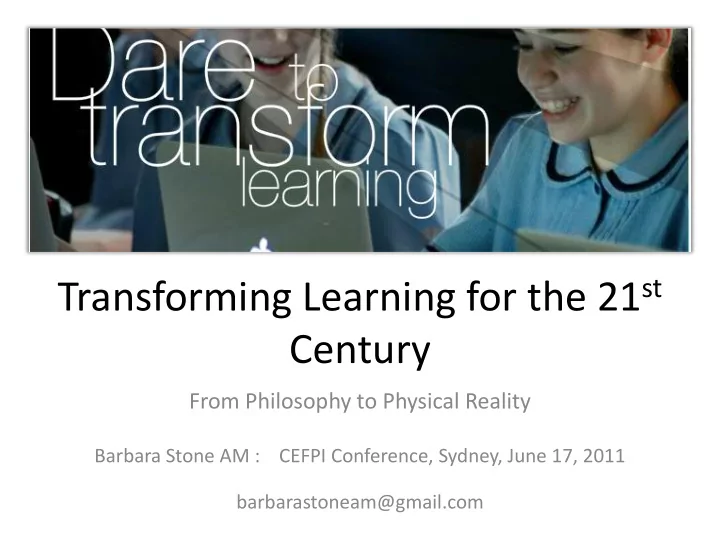

Transforming Learning for the 21 st Century From Philosophy to Physical Reality Barbara Stone AM : CEFPI Conference, Sydney, June 17, 2011 barbarastoneam@gmail.com
Changing Paradigms for the New Millennium 20th Century 21st Century • • Machine World Net World • • Tangible Invisible • • Controllable Difficult to Control • • Mechanistic Holistic • • Psyche irrelevant Psyche central • • Management Empowerment • • Predictability Change • • Conformity Diversity • • Financial bottom line Triple bottom line • • Bench Marking Becoming all you can be • • Globalisation Globality • • Broadcast Learning Interactive Learning • • Generation “X” Net Generation • •
“What a bore school is nowadays, the same as it has been for hundreds of years. What we get is the same old thing – teacher, outdated textbooks and a class fed up to the teeth with the teacher and the school. What we need is one vast change in the educational system of this country. Children do not want to be taught at, but want to find out things for themselves.” Robin, 16 Edward Blishen (Ed.) The School that I’d Like , Penguin Books, 1969, p. 59
Where did change really start for us at MLC School?
Growing up digital
MLC School Strategy Transforming Learning 21 st century skills: Engagement, Creativity, Collaboration, MLC Values: World Citizenship, Integrity, Innovation, Courage, Connection, voice Excellence, Diversity Seamless Tailoring Technology learning Local and Centres of Global Community engagement Creating a Learning Community through Collaboration and Leadership
21 st Century teachers needed new approaches and skills
School leaders needed to build in new approaches Empowerment Empowering learners at all levels: e.g. student voice, professional team building, distributed leadership Change Leading and managing change at all levels Futures focus Building capacity to anticipate what is next Globality Taking all learners global Agility Flexible planning and operation
We needed to provide more flexible learning spaces on campus
What has been learned?
Recommend
More recommend